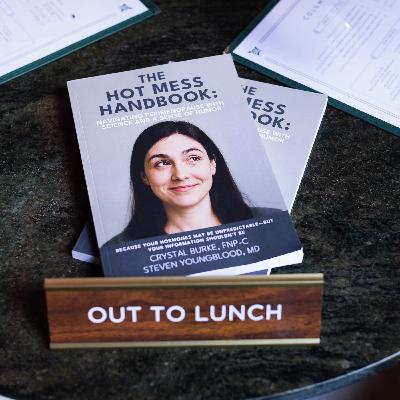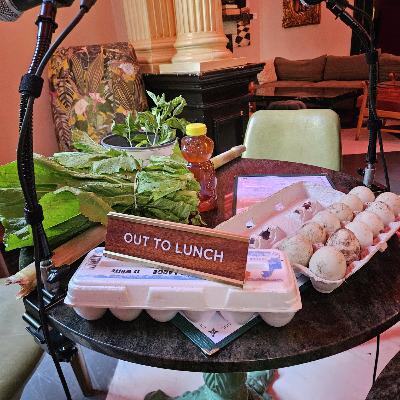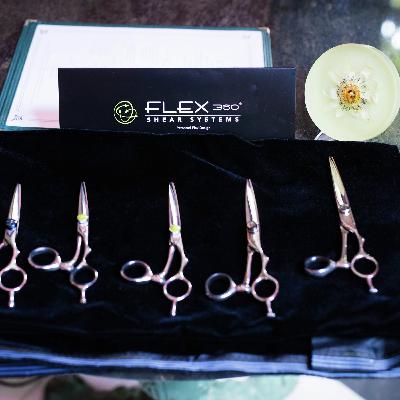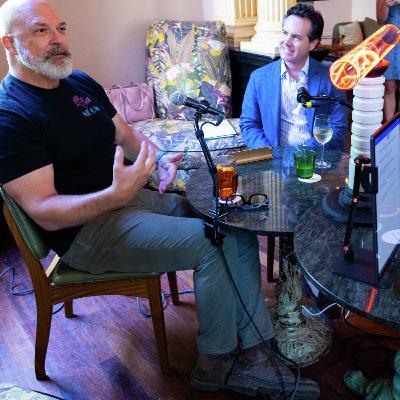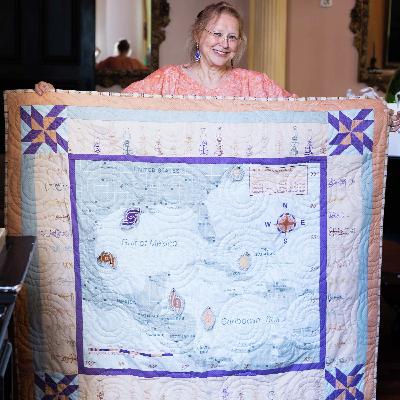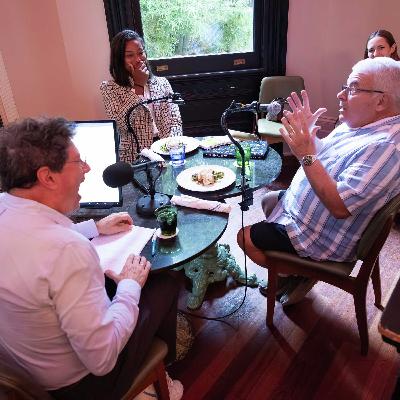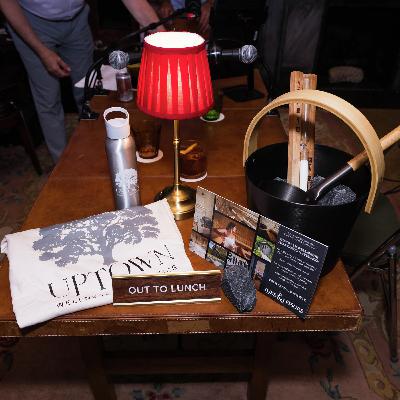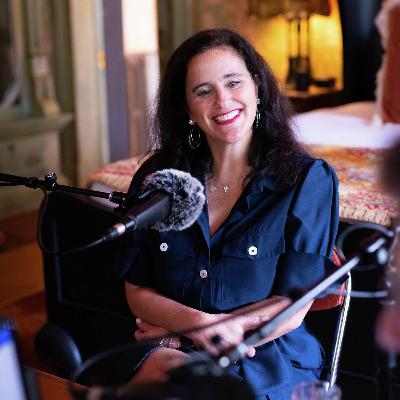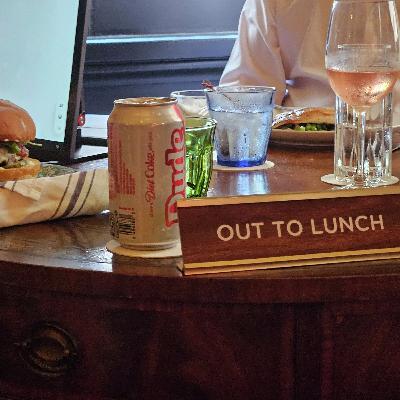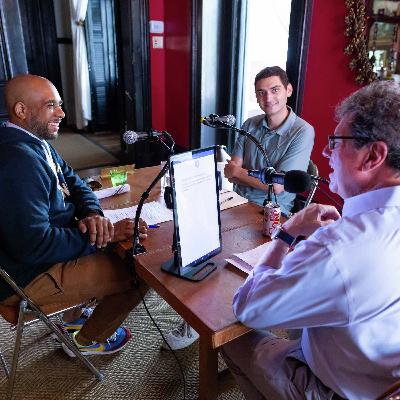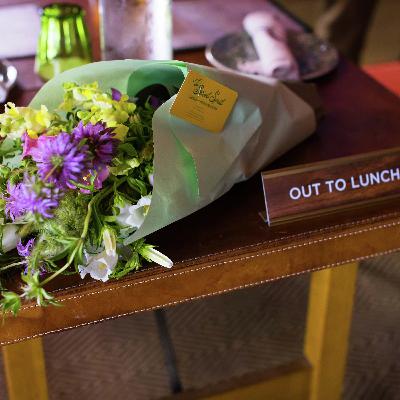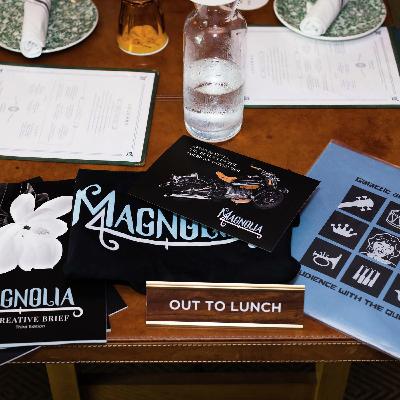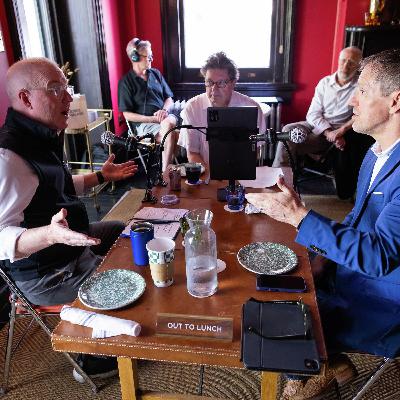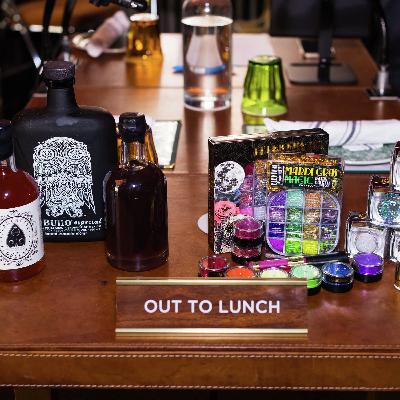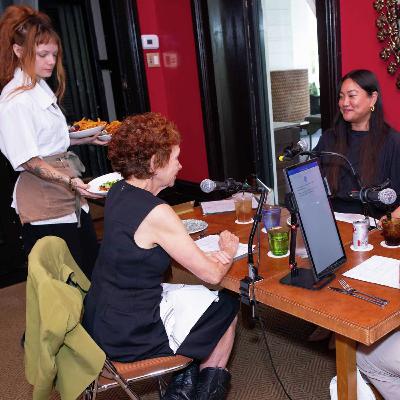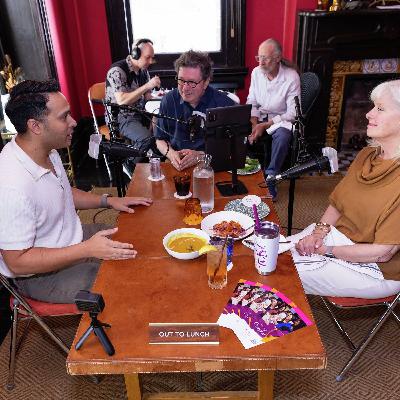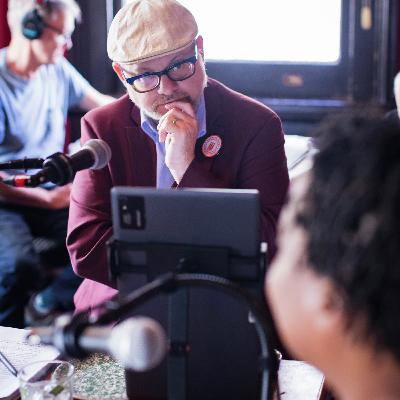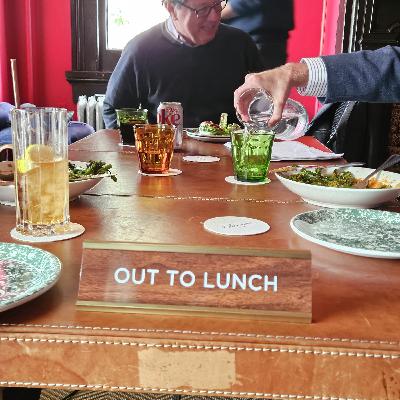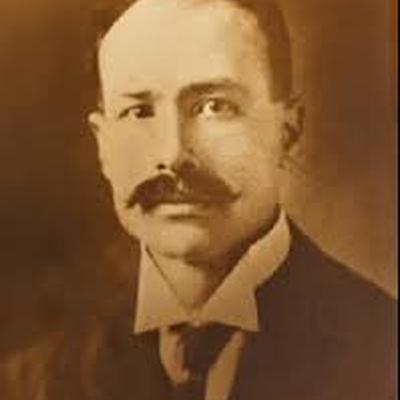Discover It's New Orleans: Out to Lunch
It's New Orleans: Out to Lunch

It's New Orleans: Out to Lunch
Author: itsneworleans.com
Subscribed: 50Played: 601Subscribe
Share
© 2025 INO
Description
OUT TO LUNCH finds economist and Tulane finance professor Peter Ricchiuti conducting business New Orleans style: over lunch at Columns in Uptown New Olreans. In his 14th year in the host seat, Ricchiuti’s learned but uniquely NOLA informal perspective has established Out to Lunch as the voice of Crescent City business. You can also hear the show on WWNO 89.9FM.
538 Episodes
Reverse
Theoretically, we understand the difference between success and happiness. But there’s a big gap between theory and reality. What bridges that gap is often, courage. Suppose you worked hard, have a great job in a competitive field, are well paid and highly regarded, but you’re not really happy… Would you have the courage to walk away from your success and take a chance doing something that might bring you very little, except, possibly, happiness? That was the question Skye Jackson answered with, “Yes.” Skye was an entertainment lawyer in Hollywood. She had a great job at The Walt Disney Company. Until 2024. That’s when Skye traded her well-paid job dealing in the precise meaning of words in legal contracts, for a low-to-no pay job dealing in the ambiguous meaning of words, as a poet. Today, Skye is a published and well-recognized poet, a professor of creative writing, literature and poetry at Xavier University, and Chairwoman of the New Orleans Poetry Festival Board. When it came time for Crystal Burke to make a change, she wanted something different not just for herself, but for every other woman in the country. As a registered nurse practitioner for over 15 years, mostly in the fields of oncology and palliative care, Crystal knows a lot about the functioning of the human body. But when she started experiencing symptoms of perimenopause in her 30’s, she was blindsided. Finding that her symptoms were influencing almost every aspect of her life, and simultaneously discovering that doctors, even OB-GYN’s, didn’t seem to know how to treat her, or other women in her position, Crystal decided to do something to change that. In 2024, Crystal and her medical doctor husband, Steven Youngblood, founded The Menopause Clinic. It’s a tele-health-based clinic where any woman with an internet connection can consult with medical providers who specialize in recognizing and treating perimenopause – which is a phase of pre-menopause - and menopause. You’ve no doubt noticed there are a lot of memes out there encouraging women to empower themselves. “You Go Girl.” “You Do You.” “Live Your Best Life.” And plenty more. One of the reasons these women-centric slogans exist at all is, in many walks of life, things are still predominantly male dominated. There are women though – Skye and Crystal are two of them – who are – for want of a better expression – taking the bull by the horns. Crystal's The Menopause Clinic is a revolutionary idea for women’s healthcare that seems way overdue. And Skye has a voice that resonates with a lot of people, especially young Black women - Skye's poetry seems to give them both her perspective and a vocabulary to reflect on themselves. Out to Lunch was recorded live over lunch at Columns in Uptown New Orleans. You can find photos from this show by Jill Lafleur at itsneworleans.com.See omnystudio.com/listener for privacy information.
Generally, by the time someone gets invited on a show like this they’ve figured out how to tell the story of their business in a way that makes their journey seem like a steady climb from humble beginnings to current success. In telling these histories, entrepreneurs will talk generally about setbacks, but they don’t typically elaborate on specific obstacles. Like, for example, this scenario: Suppose you’re a startup entrepreneur with a new product, and you get the call you’ve been waiting for, from Walmart, with a giant purchase order. Now, instead of spending $10,000 on raw materials, you’ll need $200,000. Your shipping costs are going to go from $5,000 to $50,000. And you’ll need 10 more people to pull this off, which is $1m in new salaries. You can borrow this money, no problem, right? You’re going to be able to pay it back - you have the Walmart purchase order to prove it. But you discover that no traditional lender, like a bank, will lend you money unless you’re (a) profitable and (b) have 2 years of receipts. You don’t qualify in either of those categories. So, what do you do? Well, one option is you go to a national company that’s headquartered here in New Orleans, called Republic Business Credit. Republic Business Credit specializes in what’s called Accounts Receivable Finance. Basically, they will loan a company money based on a purchase order – up to $20 million. Or, in a practice called "factoring," they’ll buy the purchase order off a company – minus a fee – so the company gets cash immediately and when the purchaser pays the invoice, the payment goes to Republic Business Credit. Leigh Guglielmo has been helping companies finance their business at Republic Business Credit since 2011. Today she’s the company’s Senior Vice President of Business Development. Another thing you hear a lot about in a typical startup success story is, the Power Point pitch. Andres Barcelo and his wife, Ashley Webb, moved to New Orleans in 2017 to be closer to Ashley’s family. Three years later, when they had their lives derailed by the pandemic, Andres and Ashley started gr owing vegetables in their 9th Ward neighborhood. When they discovered that okra, beans, cucumbers and peppers grew well, they grew more of them. Till they had so much that someone suggested they could start a farmers market. So, they did. Then they began adding products from other local folks - like bread, hand pies, candles, soap, pickles and jam. And before you know it – without a single Power Point presentation – Andres and Ashley had built a business. Today you can find Barcelo Gardens Fresh Market most days of the week in varying locations, including their flagship location on Piety Street in the Upper 9th Ward, and at pop-ups and markets in The Irish Channel, The Marigny, Harahan, and Napoleonville. There’s a saying people use in general conversation to describe how today is pretty much like every other day: “Business as usual.” Interestingly, you don’t hear a lot of people in business saying that. Mostly because business is typically anything but business as usual. There’s almost always an obstacle, a wrinkle, a problem to solve. Leigh is in the business of solving the biggest problem of them all for most businesses – operating capital. And Andres' business is dependent on the most fickle of all fundamentals – the weather. One thing they have in common is, without a lot of fanfare, they’re both doing something vital for our local business community, and community in general. Out to Lunch was recorded live over lunch at Columns in Uptown New Orleans. You can find photos from this show at itsneworleans.com. See omnystudio.com/listener for privacy information.
As human beings, we have many shared experiences. Most of us, one way or another, get a haircut. And most of us appreciate the fleeting beauty of flowers. You might think those two mundane observations are devoid of any kind of potential entrepreneurial re-invention. After all, whether your mom cuts your hair or you go to a salon, a haircut is, well, a haircut. Right? And whether you pick your own flowers or buy them from a florist, a week later they’re dead and you throw them out. Right? Wrong on both of those. When you go to a hair stylist and you sit in the chair, most of your time is spent with the hair stylist snipping at your hair with scissors. Actually, hair stylists don’t use plain old scissors. They use specially designed and sharpened types of scissors, referred to as shears. To cut hair, the stylist moves the shears on all kinds of subtle angles. They continually adjust the angle by very fine, delicate, flexing movements of their hand, wrist, arm, elbow, and shoulder. Everything flexes. Except the shears. For 25 years a hair stylist in New Mexico, by the name of Bill Brenton, along with his buddy and partner, Murray Roth, a hair stylist in Madisonville, Louisiana, worked on designing shears that would flex. Bill died in 2008. But Murray kept the dream alive and today Murray Roth manufactures and sells Flex 360: ergonomic, patented shears used by hair stylists across the country and around the world. The engineering trick to the flexing shears is - the loop you put your thumb through is on a swivel. And so, to flowers. Sometimes you pick a few flowers or buy them from a florist or supermarket, to brighten up your living or work space. But other times, that bunch of flowers is more than just a dash of color on your coffee table. They might be the bunch of flowers you held at your wedding. Or flowers from the funeral of a loved one. Or flowers from any number of other occasions that mean something to you. If you’ve ever wished you could keep those flowers forever, now you can. Stephanie Tarrant is a florist and an artist. She combines her talents by taking flowers and preserving them. They look as real as the day they were picked, and they retain their same vibrant colors - forever. Stephanie preserves whole bouquets in resin. She takes flowers and incorporates them into pieces of jewelry. And into dishes and trays. Steph’s company is called, The Crypt Flowers. Its slogan is, “All flowers deserve forever.” Innovation is often born out of frustration. Most of us, when we’re frustrated, complain about things being the way they are. Successful innovators, though, are people who don’t just complain, but decide to do something to change the status quo. At either end of the spectrum - whether it’s something that grows continually, like hair, or something whose life is fleeting, like flowers, both Steph and Murray have been able to improve on what appears to most people to simply be the way of the world. Out to Lunch was recorded live over lunch at Columns in Uptown New Orleans. You can find photos from this show by Jill Lafleur at itsneworleans.com.See omnystudio.com/listener for privacy information.
When you walk into a home, a room, or a business, you typically have a single sensation. A place feels a certain way. That specific reaction is actually the culmination of a whole range of perceptions that include observations about dimensions, light, color, furniture shapes and sizes, painting on the walls, decorative touches, rugs, even scent. You take most of these cues in at the same time and your decision about how you feel about the place can be almost instant. But the creation of an intentionally designed interior space can take months of planning and execution. Chad Graci is a native New Orleanian who spent years creating interiors around the world and across the country – including 6 years in New York – before returning home and founding Graci Interiors in 2009. Today, Chad still works across the country, and you can see his designed spaces in both homes and businesses locally here in New Orleans. While Chad is working on creating subtle visual cues, Nate Shaeffer, is doing the exact opposite. He’s looking to make an instant impression on you that’s bright and colorful. Pretty much all you have to know is the name of Nate’s company for you to get the picture. It’s, Big Sexy Neon. Nate is an artist and craftsman who hand-crafts neon – both signs and works of art. He’s one of only 300 neon artists in the US who work in neon. There’s definitely something magical about neon. Maybe it’s the vibration of the light, maybe it’s the association with something exciting, like the Vegas strip or Times Square, or cocktails, donuts, or beer… Whatever it is, Nate is doing everything he can to keep it alive here in New Orleans. Chad is likewise making the city a brighter place, but with less red and green amd more cream and white. That very balance - a bright exterior and sophisticated interior - is both a metaphor and literal description of life in New Orleans. Out to Lunch was recorded live over lunch at Columns in Uptown New Orleans. You can find photos from this show by Jill Lafleur at itsneworleans.com.See omnystudio.com/listener for privacy information.
Fewer than 400,000 people live in Orleans Parish. Every year we also have around 19 million temporary residents. Also known as “tourists.” New Orleanians tend to think of these two populations as distinct – even at odds with each other. But in fact, our local economy is entwined with our tourist economy in ways you might not expect. A great case study is a business called Chateau Sew. Chateau Sew is a fabric store on St Charles Avenue. They sell sewing patterns, supplies, and specialty fabrics. The owner of Chateau Sew, Laura Fenner, also teaches sewing classes. There’s no bar at Chateau Sew. You can’t get a hurricane. Or a muffuletta. Or a New Orleans T-shirt. But when it comes to customers, tourists outnumber locals. Apparently, they’re mostly a lesser-known sub-genus of tourist, called “quilters.” When out-of-town quilters visit Chateau Sew they’re looking for unique fabrics they can’t get anywhere else. Fabrics like the creations of New Orleans fabric design company, Marillyn In The Moon. Marillyn In The Moon’s fabrics are in stores in New Orleans, across Louisiana, and in Mississippi and Alabama. The designer and manufacturer at Marillyn In The Moon is native New Orleanian, Robin Brou Antin. Robin’s fabric designs are rooted in New Orleans culture, inspired by her family’s history of 9 generations in the German Coast of Louisiana, and her fabric is manufactured by a specialist in high-quality production in South Korea. Out to Lunch was recorded live over lunch at Columns in Uptown New Orleans. You can find photos from this show by Jill Lafleur at itsneworleans.com.See omnystudio.com/listener for privacy information.
As a society, we’re generally focused on achievement. We celebrate when a person gets into college. And we celebrate when they graduate. In between, when it comes to winning monthly, weekly, and sometimes daily battles - like structuring your day to attend classes and study for tests; and how to budget to afford tuition, books, transportation, food, and rent – well, we typically leave people to figure that out on their own. It turns out that’s an okay strategy for students who start out with reasonable financial resources. But, not so good for those who don’t. For low-income students who get into college, only 12% graduate with a 4-year degree. That’s the statistic that largely motivates an organization called College Beyond. College Beyond works with low-income students to assist them with finances, coaching, and navigating college to stay in the race to the finish line. Each year they work with over 350 New Orleans college students. Clara Baron-Hyppolite is Executive Director of College Beyond. If you go to college and get a degree in arts, communication, or journalism, you might want to go work for a newspaper. The reason we still call it a newspaper is that it was originally news printed on paper. Today, most of us read the newspaper on a digital device, but there are still people who like to read the newspaper in its original form, on paper. For those folks, they can subscribe and get the paper delivered. Or, here in New Orleans, they can pick up a copy of The Times Picayune by slipping quarters into a slot in a metal box, open a hinged door, and take a newspaper off the stack inside. If you’re one of the people who gets your paper this way, have you ever wondered how the paper gets into the box? The answer to that question for 60 boxes around New Orleans is, Hector Garcia. Hector is an independent contractor who buys papers from the publisher of The Times Picayune, puts them in the boxes, then collects the quarters. College Beyond is never going to be Apple or Amazon – but they just might be helping someone graduate who goes on to change the world. And Hector is never going to win a Pulitzer Prize for journalism, but without people like him nor would anybody else, because the news would never get disseminated. It’s true, we typically reserve accolades for people who are visibly successful, but the intensity of the spotlight is not a measure of true worth. In Hector and Clara's cases, the forgotten middle is a noble place to be. Out to Lunch was recorded live over lunch at Columns in Uptown New Orleans. You can find photos from this show by Jill Lafleur at itsneworleans.com. See omnystudio.com/listener for privacy information.
There’s a difference between an unintentional and an intentional experience. For example, you could be wandering down Oak Street at night and unintentionally hear music coming out of The Maple Leaf. It might sound great, but it sounds a whole lot better if you intentionally go into the club and stand in front of the stage. Likewise with heat and humidity. Living in New Orleans you no doubt gain some benefit from unintentionally sweating in the sauna-like weather - but it’s not the same as the health benefits you get from intentionally stepping into a real sauna. Eric Trombly is the owner of Luxe & Leisure Saunas. He designs and builds custom saunas and steam rooms. Yes, in New Orleans. If you don’t want to commit to putting a sauna in your home or business, you can go take a sauna - and do a lot more for your health and wellness - at Uptown Wellness + Aesthetics on Magazine Street. Uptown Wellness + Aesthetics is a health spa where you can get a wide range of services including cryotherapy, cold plunge, IV therapy, red light therapy, and cryo-sculpting. Jacob Tramontin is the owner of Uptown Wellness + Aesthetics. Jacob is a recovering attorney who was president of Go Auto Insurance before discovering his calling in the wellness industry and investing north of $1m to create his Uptown wellness spa. It can take a long time to figure stuff out. As a society, it’s taken us decades to come to the realization that what we regard as “health care” isn’t actually taking care of our health. Getting medical attention when there’s something wrong with us is actually taking care of illness or disease. More and more we’re coming to realize that taking real care of our health means taking preventive care - and each of us individually has to seek that out. There are lots of things you can do to stay healthy. Among them, sauna and the services you can get at a health spa are legitimate options. Out to Lunch was recorded live over lunch at Columns in Uptown New Orleans. This week, air conditioning problems in our regular meeting room chased the show lout of its regular spot into a delightful hotel room, Room 17 to be exact. You can find photos from this show by Jill Lafleur at itsneworleans.com.See omnystudio.com/listener for privacy information.
People who own or run factories and refineries love to complain about how onerous it is to comply with the rules and regulations laid out by OSHA – the federal Occupational Safety and Health Administration. On the other hand, these same businesses brag about their safety record to attract and retain good employees. A local New Orleans company, American Safety, combines both of these elements in its day-to-day business: it consults on workplace safety, provides employee safety training, and it also finds and provides skilled, trained industrial employees. Corey Rosales is President and CEO of American Safety. On occasion, companies run afoul of OSHA. Usually it’s unintentional. Factories and refineries know they have to be OSHA compliant so for the most part they’re not setting out to cut corners or cheap-out on their employees’ safety. But things go wrong. Accidents happen. When they do, companies have to answer to OSHA. To help them navigate through that process and to set them up for a compliant, safer future, companies typically turn to lawyers who specialize in labor and employment law. One of our major sponsors at Out to Lunch is the law firm of Jones Walker. We’re taking advantage of that relationship today by inviting Jane Heidingsfelder to lunch. Jane is a partner at Jones Walker and a specialist in labor and employment law. She started at the firm in 2004 and to date she’s written over 50 articles about various aspects of labor law. As a leading legal authority on OSHA, Jane has clients all over the country. most of us, when we hear the term “Workplace safety” might react like we do during the safety instructions on a plane before take-off: We know it’s important, but we tune it out because we’ve heard it all before, and we hope it’s never going to happen. Indifference, denial, and hoping are not strategies for creating a safe and healthy work environment. When an incident occurs that you’re not prepared for, it can plunge a great job - or a great company - into a healthcare, employment, financial, and legal nightmare. Corey Rosales is dedicated to making sure that workday doesn’t come. Jane Heidingsfelder is also dedicated to heading off disasters before they happen, and to mitigating their after-effects when they do. Out to Lunch was recorded live over lunch at Columns in Uptown New Orleans. You can find photos from this show by Jill Lafleur at itsneworleans.com.See omnystudio.com/listener for privacy information.
If you’ve got a high school kid in public school in New Orleans and your kid is interested in pursuing anything in the arts – like music, dance, theater, film, even creative writing – you find out pretty quickly, the school doesn’t have a budget for that. To put on a play, publish a newspaper, learn dance, or most other musical and artistic pursuits, the funds required generally come from fundraisers, or parents’ pockets. Now, when you get to a public high school like NOCCA – the New Orleans Center for the Creative Arts – where education and excellence in the arts is the very reason for its existence – it would be impossible to expect bake sales or parents to foot the bill for those expenses. So where does that money come from? It comes from an organization dedicated to raising the funds that help power NOCCA, called the NOCCA Foundation. Adonis Rose is a NOCCA graduate who has gone on to a successful career as a jazz musician. Adonis has won a Grammy, he’s played on every stage that matters - including Carnegie Hall and the Lincoln Center - he’s accompanied legends like Dianne Reeves and Wynton Marsalis, and since 2024 he’s been Executive Director of the NOCCA Foundation. One of the arts your high school kid might like to study is film. If they do, maybe they’ll graduate and go to film school. And then, if they want to be in the film business they’ll have to move to someplace else where they make movies. Because everybody here seems to agree that apart from a few brief and wonderful years when we were known as “Hollywood South,” there’s no way to have a career in the film business in New Orleans. Don’t tell that to Kenny Morrison. Kenny has been making a nationwide career for himself as a New Orleans-based film-maker since 2001. He principally makes high-end and big-budget commercials – many of which you have certainly seen - for the likes of banks, shoes, hospitals and insurance companies. Kenny is what’s known in the film business as a triple threat – director, cinematographer, and an entrepreneurial film technologist, pioneering cutting-edge visual effects through his virtual-production company, Lucy XR. It used to be generally accepted that there were real jobs – like lawyers, doctors and plumbers – and then there were b.s. jobs like actors, musicians, and film makers. We don’t think so much like that anymore. Maybe it changed because an actor, Ronald Reagan, became one of the most popular Republican presidents of the 20th Century. Jay Z had a successful career as a musician before creating a music business empire. Artists have made millions of dollars selling works of art in the crypto space as NFT’s. Online content creators clean up collaborating with fashion houses and sneaker manufacturers. The demarcation line between art and business has gotten blurred. Locally, Adonis Rose and Kenny Morrison continue to demonstrate that creativity and commerce can happily co-exist. And that’s a lesson we need to take to heart here in New Orleans, perhaps more than any city in the country. Out to Lunch was recorded live over lunch at Columns in Uptown New Orleans. Andrew Ward sits in hosting for Peter Ricchiuti. You can find photos from this show at itsneworleans.com.See omnystudio.com/listener for privacy information.
I’m sitting at a table with two people: Patrick and Conway. In front of me, there’s a knife. I could use the knife to cut the food on my plate. Or I could lunge across the table and stab Conway with it. If I did that, what would you say Patrick is supposed to do? He could do nothing. He could call 911 – to get an ambulance for Conway and a cop to arrest me. Or he could intervene – try and subdue me before I hurt Conway or other people. That is, in fact, more or less what Patrick Young actually does. Every day. For 3 years Patrick was the Director of Gun Violence Prevention for the City of New Orleans. In 2024 he founded 4 Social Peace. It’s the first organization in the country dedicated solely to digital community violence intervention. 4 Social Peace focuses on the links between threats and aggression on social media, real world crime, and the struggles of people trying to re-integrate after being released from incarceration. It's rooted in Patrick’s lived experience. Well, the good news is, I didn’t stab Conway Solomon, so I can tell you - he’s Co-Founder and CEO of a company called Wrstbnd. We first met Conway in 2020 when we were doing Out to Lunch on Zoom because of the pandemic and Conway had plenty of time on his hands because nobody was going to a live event where they’d be needing a hi-tech electronic wristband to get in the door. That was then. Today Wrstbnd is a real-world applied technology success story. It’s – as the name suggests - a wristband - that’s also an integrated event organization gadget and platform - kind of like a live event version of the Apple Watch or the Oura Ring. A person attending an event gets an electronic wristband that, first of all, allows people to flow into a big event in almost real time without stopping to have a ticket checked. The Wrstbnd knows whether people are VIPs or have special needs and tracks their whereabouts. It can be used for super-fast transactions – think, speeding up the lines for drinks, food or merch. Wrstbnd partners with international event promotion company AEG, one of the producers of New Orleans Jazz Fest. Out to Lunch was recorded live over lunch at Columns in Uptown New Orleans. You can find photos from this show by Jill Lafleur at itsneworleans.com.See omnystudio.com/listener for privacy information.
New Orleans is a city of neighborhoods. 73 of them. Each one of these neighborhoods has its own flavor, its unique characteristics, and residents who can tell you about people who were brought up there and went on to do something notable. Claus Sadlier grew up in Old Metairie. It’s possible you don’t know who Claus is. If you’ve stopped at a coffee shop to grab a cup of joe to go - Claus is the guy who invented the paper cup you got your coffee in. Back in the early 90’s, when to-go coffee was still sold in Styrofoam cups, Claus created an insulated paper cup. And sold the design to Dixie Cups for $170 million. Claus went on to invent other stuff as well. Then in 2013, having conquered the world, he followed his heart back to New Orleans. He bought a home in the French Quarter and decided to use some of his good fortune to celebrate a singular New Orleans neighborhood and its claim to fame: prostitution. In September 2024, after years of research, planning and design, Claus Sadlier opened The New Orleans Storyville Museum. It’s been many years since New Orleans had a legal sex-worker district. But we’re still a city that proudly runs on our reputation for fun - from restaurants, bars, and drinking on the street, to music festivals and corporate conventions. A lot of this hospitality and tourist industry – and its allied occupations like security, sanitation, and infrastructure maintenance – is powered by people who don’t make a lot of money. As the city gets more prosperous, these folks, who are the heart and soul of New Orleans’ economy, don’t benefit from gentrification if they don’t own a house. And if they’re renting, they can end up being priced out of their neighborhood. That’s where Oji Alexander’s business, People’s Housing Plus, comes in. People's Housing Plus is a property development company. They buy land, build houses, and sell or rent them. But only to low and moderate income New Orleanians. By controlling every step of the process, from financing through construction, houses are affordable. And with a stewardship program that continues after a sale, continued maintenance is affordable too. It’s sometimes hard to describe to people who don’t live in New Orleans exactly what makes it such a unique place. Yes, it’s physically beautiful to look at, the food’s great, there’s always good music, it’s relatively affordable, and the climate is – with a few exceptions – mostly pleasant. But none of that adequately explains the actual experience of living here. The next time you’re looking for a way to explain what that’s like, you might point to this episode of Out to Lunch. You could describe it like this: “In a historic building on the most exclusive tree-lined avenue in the city, as streetcars rattle by, a successful design engineer who invented the paper coffee cup and built a museum celebrating jazz, gambling and prostitution, has lunch with a property developer building houses for low income citizens – and nobody’s in a hurry to get anywhere when it’s over.” Out to Lunch was recorded live over lunch at Columns in Uptown New Orleans. You can find photos from this show by Jill Lafleur at itsneworleans.com.See omnystudio.com/listener for privacy information.
You may have heard people who started up businesses talking about how they found investors. Typically, they’ll say something like, “We pitched our idea and raised X amount.” It sounds simple. But when you dig a little deeper, delivering a successful pitch to investors is not quite as straightforward as describing your business as “The Uber of dating” or “Air BnB for pets.” Financing a startup requires convincing investors or lenders they’re taking a worthwhile risk. Crafting this calculated risk into a convincing sales pitch - which can be in the shape of a business plan or a presentation known as a “pitch deck” – is a special skill. And it’s what Camille Terk does at her company, Terk Consulting. Tey Stiteler came up with her idea for a business after she and her partner bought 4 acres of land near Poplarville, Mississippi. Tey was looking for a reason to quit her desk-job and work outdoors. With absolutely no background in farming or horticulture, Tey started growing flowers. She grew a lot of flowers. And started meeting other people who grew flowers. Tey began selling her flowers at markets and pop-ups around New Orleans. Then in 2024 when she went all-in and opened a brick and mortar business on Camp Street. It’s called, The Secret Spot Flowers. There’s a question I’ve heard interviewers ask people. It’s, “If you could go back in time to when you were starting out, what would you tell your younger self?” I don't ask either Camille or Tey this question but there’s no doubt that if they, and most people, knew what roadblocks and curveballs and just downright weird, unexpected things were going to come up when they started down the path of founding and running a business, they might question their optimism and the wisdom of blind faith. On the other hand, when things work out, as they have so far for Tey and Camille, the ups and downs become a bunch of great stories. Out to Lunch was recorded live over lunch at Columns in Uptown New Orleans. You can find photos from this show by Jill Lafleur at itsneworleans.com.See omnystudio.com/listener for privacy information.
There are countless myths and reports throughout human history of places where spirits come down to earth. Where the intangible meets the material world. In the US, there are few places that better demonstrate this crossroads than New Orleans. People have tried to explain how the joy of living here triumphs over everyday things like dysfunction and potholes, with slogans like “The Big Easy,” and “The city that care forgot.” One of the locations you can witness this triumph of the spirit is the corner of Napoleon Avenue and Tchoupitoulas Street. No, not Rouse’s. Across the street. At Tipitina’s music club. Keith Spera from the Times Picayune has called Tipitina’s, “a sacred space.” Dr. John called it, “The church of the funky saints.” And Jazz Fest co-founder Quint Davis has referred to it as, “The Vatican of New Orleans music.” Tipitina’s was founded in 1977 by a bunch of young people who knew nothing about business, music promotion, running a restaurant, a bar, or a radio station – it was the original home of WWOZ. These folks just wanted a place that celebrated New Orleans musicians and gave them a stage to play on - and a guarantee they’d actually get the money that people paid to come see them. In 2018, history repeated itself when the members of the New Orleans band Galactic bought Tipitina’s. Musicians are not typically known for their firm grasp of the music business, but the doors are still open and the revenue streams have diversified, including a record business called Tipitina’s Record Club. Robert Mercurio is the bass player in Galactic, part owner of the legendary Tipitina’s music club, and Co-Founder of Tipitina’s Record Club. Besides music, there’s another strand of New Orleans where art meets commerce, and where, literally, the rubber meets the road. Motorcycle design and manufacture. It’s a lot less celebrated than our place in the history of music, but if you know a thing or two about motorbikes you’ll know my other lunch guest today, J.T. Nesbitt. J.T designed and was part of the team that produced motorcycles called The Wraith, the G2 Hellcat and The Magnolia Special, for Confederate Motorcycles, and later an electric bike, The Curtiss One. They’re all elegant works of art and powerful machines. Today, JT is designing and building a new line of bikes under the banner of his own company, Bienville Studios. Currently he’s building a bike called the Magnolia 4. We find out all about it in this edition of Out to Lunch but for now all you need to know is Jay Leno has one on order. The Tipitina’s logo with the half-peeled banana is a New Orleans icon. For locals and live music lovers everywhere it’s as recognizable as the Nike swoosh or the Mercedes hood ornament. Nike and Mercedes spend millions of dollars each year to keep their brands in front of people. Tipitina’s brand is spread mostly by people paying them – to buy a T-shirt or baseball cap. The lesson being, when you have a product people genuinely care about and cherish, it sells itself. The same philosophy can be applied to the motorbikes coming out of Bienville Studios. Robert Mercurio and J.T. Nesbitt are both at the helm of very different but equally unique and valuable New Orleans pieces of art and commerce. Out to Lunch was recorded live over lunch at Columns in Uptown New Orleans. You can find photos from this show by Jill Lafleur at itsneworleans.com.See omnystudio.com/listener for privacy information.
In the 1800’s Thomas Edison invented, among other things, the light bulb, the record player, and the first motion picture capture device which paved the way for the birth of movies. Was Thomas Edison a genius? In response to that question Edison said, “Genius is one percent inspiration and 99% perspiration.” Meaning, you can have a great idea, but you also have to have the tenacity and work ethic to bring it to life. So, how do you do that? New Orleans’ two most recently successful companies, Lucid – which sold for over one billion dollars, and Levelset, which sold for 500 million - were both founded with assistance from business accelerator, The Idea Village. Today, a lot of entrepreneurs owe their foundational steps, and their growth, to business accelerators and incubators. Okay, but what if you have a great idea for a business, and you don’t get accepted to a business incubator? Or maybe you live in a place where there is no incubator, accelerator, or even anyone who can give you any business advice at all. Then what do you do? Then, you ask Solomon. Solomon is an AI-powered business accelerator. But the business guidance you’re going to get from it is not generic AI advice pulled off the internet. Solomon’s business advice is drawn from the experience of real humans, who Solomon refers to as “Luminaries.” One of these luminaries is Chris Meaux. Chris is the grandfather of Louisiana startups, the founder of the revolutionary food delivery app Waitr. At Waitr Chris came up with the technology that took food delivery beyond pizza and Chinese food to all restaurants, and paved the way for a generational change in dining in. Today, Chris is Co-Founder of a company called QiMana. It’s the company that created Solomon. Peter's other lunch guest, Chuck Perrett, had an architectural inspiration. Chuck is not an architect. He grew up in a family business that printed architectural blueprints. With the advent of the internet, architects started relying less on printed blueprints and instead started emailing contractors and sub-contractors. Now, if you’ve ever tried to organize anything more complex than dinner for two by email, you know what a cluster that can turn into. So, imagine how unwieldy an email chain gets when you’re trying to communicate about construction and design issues with contractors and sub-contractors. That’s why Chuck Perrett was inspired to create Centerline, a cloud-based data management for architects that pulls all of their project-related information out of their inbox and puts it into what’s called a Project Information Model. Chuck launched Centerline in 2021, began taking clients in 2022, saw 350% growth in 2023, and today the company has architectural firm clients across the country. There are only so many hours in a day. You can fill them doing any number of things. You can go to work, you can come home and relax, maybe go see a movie, watch TV, write poetry, play sports... Or you could invent an online business consultancy Or reinvent architectural communication. Out to Lunch was recorded live over lunch at Columns in Uptown New Orleans. You can find photos from this show by Jill Lafleur at itsneworleans.com.See omnystudio.com/listener for privacy information.
Maybe this has happened to you. You stumble onto a great new show on Netflix - and when you tell your friends about it, everybody seems to know about it already. But for some reason you never got the memo. Peter's lunch guests today don’t have shows on Netflix, but they both have unique stories and successful businesses that maybe you know all about, but in Peter's orbit they’ve flown under the radar. Until now. Haley Saucier is the owner of Espiritu Mezcaleria and Cocina. It’s a Mexican restaurant. But it’s Haley’s focus on Mezcal that sets her business apart - not just from other New Orleans restaurants but from bars and restaurants everywhere. With over 100 types of Mezcal and tequila, Espiritu offers a specialty Master Mezcal Certification program that’s the only school of its type recognized outside of Mexico. It’s so legit that if you take the Mezcal course at Espiritu you get Mexican college credits. And that’s just one aspect of Haley Saucier’s intriguing business and life story. Danielle Smith has an equally intriguing story and business. Danielle is the owner of Elektra Cosmetics. The company specializes in glitter. Danielle was working in healthcare when she bought Elektra Cosmetics for $5,000 off a person she met at a burlesque conference. That was 2016. When Danielle moved to New Orleans she started selling glitter to burlesque performers and cheerleaders. Then she realized she’s living in a city where women don’t quit glitter when they age out of shopping at Claire’s. Today Danielle calls Elektra Cosmetics, “glitter for grownups” and her average customers are women from 30-60, including soccer moms and sports fans. Elektra Cosmetics has over 100 different types of glitter gels. They’ve supplied glitter to corporate clients like Nike, Crown Royal, and Dr Pepper. And, probably needless to say, Danielle has left her career in healthcare to dedicate herself to brightening the world with glitter. People have various explanations for why things happen the way they do. Haley was kind enough to cover a couple of bar shifts for a friend - and that led eventually to her becoming an authority on Mezcal and owning Espiritu. Danielle's unplanned encounter with a person who was selling a glitter company led her away from a life in healthcare and into a career in cosmetics. Whether you put these inciting incidents down to the Universe having a plan for you, sheer chance, or simply a series of bold decisions, there’s no doubt that the hard work that both these entrepreneurs have put in since starting down these paths is what has turned these intriguing ideas into booming businesses. Out to Lunch was recorded live over lunch at Columns in Uptown New Orleans. You can find photos from this show by Jill Lafleur at itsneworleans.com.See omnystudio.com/listener for privacy information.
I’m going to hit you with some statistics. About women. Here’s the first one: Around 50% of the population in the US are women. You probably knew that one. Here’s another one. Women-owned businesses. According to the National Association of Women Business Owners, 42% of existing US businesses are owned by women. So, pretty good. Right? Now, we move on to entrepreneurs. This one’s not so good. Of all the people who start up and run a new business – only 20-25% are women. So, now we get to - the percentage of venture capital invested in those startup businesses. What percentage of venture capital goes to women startup entrepreneurs? You’re probably picking up on the trend here: downward. We’ve gone from around 50%, to 42 to 25. So, if this downward slide were to continue steadily, you might expect women entrepreneurs only receive 15% of all investment capital in the US. That would be pretty dismal. Wouldn’t it? Given that they make up 25% of the startup population. The actual statistic is 2%. As extraordinary as it may seem going into the second quarter of the 21st century, women entrepreneurs in the United States receive merely 2% of all venture capital. That’s why, here in New Orleans, Jane Cooper and her colleagues run an investment company called Flamingo Funders. Flamingo Funders are a group of women investors who invest in women founders. They started in 2022 and so far they’ve invested close to quarter of a million dollars in 6 companies. Tiffany Langlinais started her business, Freret Napoleon, in 2014. Back then Tiffany was making handmade jewelry out of oyster shells. She went from selling a few, to getting featured in several fashion shows, and soon her jewelry was available in 55 stores across the country. Tiffany figured if she could take her own product and market it successfully, she could probably do the same for other people’s products too. That’s why today Freret Napoleon is a marketing firm that offers a wide range of services and boasts an impressive list of clients as interesting as Cane River Pecan Company and Piety & Desire Chocolates, and as diverse as Brennans and The Bulldog. The namesakes of Tiffany's company, Freret and Napoleon, were both men who had an impact on New Orleans. William Freret was mayor of New Orleans in the 1800’s, and Napoleon was… well, without the Louisiana Purchase who knows what the fate of New Orleans may have been? Throughout the history of New Orleans there have also been a number of significant women, including Marie Laveau, Ruby Bridges, Mahalia Jackson, and in business the colorful Norma Wallace. Flamingo Funders may well find and fund the next successful woman to come from New Orleans, and Freret Napoleon may well get to represent them. That would be a certain kind of poetic justice. Out to Lunch was recorded live over lunch at Columns in Uptown New Orleans. You can find photos from this show by Jill Lafleur at itsneworleans.com.See omnystudio.com/listener for privacy information.
People typically get invited onto shows like this because they’re successful. So, it will come as no surprise to you that my two guests on Out to Lunch today have success stories. What might surprise you, is the magnitude of their success. Cathy Deano is the founder of Painting With a Twist. It’s a pretty simple concept: you get one or two friends together, you go to a Painting With A Twist studio, you get given a canvas and paints, and with the gentle guidance of the resident artist, you sip wine and paint a painting. Cathy lives in Mandeville and founded the company in 2007. When her local studios started getting popular, Cathy started franchising the concept. Today, there are over 230 Painting With A Twist franchises, in 38 states. Over 5 million people have created over 10 million paintings. 86% of Painting With A Twist customers have gone more than once, and 51% have visited 6 times or more. Painting With A Twist is a genuine franchise success story. And its corporate headquarters is still in Mandeville. Sami Khan is a graduate of Tulane Business School, and the creator of an online game called Atlas Earth. The world is divided into two kinds of people. Those who say, “Wow, Sami Khan is here?” And those who say, “What the heck is Atlas Earth?” If you fall into the latter category, Atlas Earth is the number-one ranked, top-grossing gaming app in its category in the United Sates - and in every other country where it has launched. It’s a digital re-creation of the real world in which players buy digital real estate that corresponds to real estate properties on earth. You can’t buy just anything though, you have to be in actual real-world proximity to what you’re buying. Players buy and sell properties using digital currency called “Atlas Bucks,” which they can also earn by buying real-world products at participating vendors like Sonic, Popeyes, and Jimmy Johns. Atlas Earth is a hybrid digital-real-world experience, like Mark Zuckerberg was envisaging when he launched Meta. Except Atlas Earth has over 850,000 monthly users, three times more than Meta’s Active Universe had at its peak. Out to Lunch was recorded live over lunch at Columns in Uptown New Orleans. You can find photos from this show by Jill Lafleur at itsneworleans.com.See omnystudio.com/listener for privacy information.
If you’re a visual artist and you have an idea for something you want to create, there’s not much standing between you and making your vision a reality. Maybe just a piece of paper and a pencil. However, if your idea for a new creation is a business, well, things are a bit more complex. If you grew up in a community or a family who were not business-people, or you didn’t get a business education, you might have little idea of what is even required to launch a business. On top of that, if you’re a member of a minority community you may find there are other layers of difficulty that present even more obstacles. And this is where a New Orleans organization called Camelback Ventures comes in. Camelback Ventures describe themselves as “a rigorous venture accelerator, providing capital, coaching and community for innovative entrepreneurs.” Because, they say, genius is equally distributed, but opportunity is not, they’re here to right the balance. The CEO of Camelback Ventures is Shawna Young. Once you’ve got your business up and running, a big problem you come up against is growth. You need to hire people. You need to pay them. And you need to keep them happy, so they don’t leave. Each one of these steps is more challenging than you might think at the outset. Hiring requires finding the right people, and knowing how to interview them, so there are no surprises later. Paying employees requires complying with a maze of taxation and accounting procedures. And holding on to good employees requires knowing something about incentivizing a workforce. You probably didn’t get into business to do any of this. And if you don’t want to deal with it you can turn to a local payroll and HR company, called Crescent Payroll and HR. The founder and president of Crescent Payroll and HR is Sanders Offner. There’s a difference between a great idea and, well, everything that follows. Getting married is a great idea. Being married is a whole other thing. Similarly, starting a business, though far from simple, is largely exciting and fun – it’s a challenging process of discovery. Running a business, on the other hand, is an exercise in constant problem-solving that ranges from coping with the mundanity of office supplies to the grand vision of growth. Shawna is focused on starting businesses. Sanders is focused on running them. These two processes are inextricably interdependent in a manner that’s best expressed by Frank Sinatra and lyricist Sammy Cahn: “You can’t have one without the other.” Andrew Ward sits in for Peter Ricchiuti on this edition of Out to unch, recorded live over lunch at Columns in Uptown New Orleans. You can find photos from this show by Jill Lafleur at itsneworleans.com.See omnystudio.com/listener for privacy information.
You can do a lot with money. After you’ve spent it on necessities like food, housing, and education, if you’ve got money to spare you can buy stuff. Or, you can use your excess money to make more money. There are fundamentally two ways of doing this. Investing. And gambling. There are people who will argue that those two are actually the same. It’ll be interesting to see if my lunch guests today draw any similarity between their two occupations – which are, investing and gambling. On the investment side, Mike Eckert is Chairman of an organization called Gulf South Angels. The word “angels” refers to angel investors. These are people who put money into very early-stage businesses where there might be little more to invest in than a concept, a business plan, and an enthusiastic founder. The last time we met Mike was 2014. At that time he was launching a New Orleans angel investment group called NOLA Angel Network. That was to become the nucleus of the current, much larger organization. Gulf South Angels network is spread across 12 states. There are around 135 angel members. And to date they’ve invested over $20m in a diverse range of companies, from aerospace to pet food. And so, to the other method of using your surplus capital to generate more money: gambling. If you’re a certain age you may remember a time when there was no legalized gambling in the state of Louisiana. The state legislature eventually figured out a way to compromise between the anti-gambling faction and the pro-gambling folks, by allowing gambling, without actually allowing it. They achieved this seemingly impossible feat by permitting gambling only on riverboats, not on land. But they also allowed riverboats to tie up to a dock, and didn’t require them to actually sail anywhere. One of these gambling vessels was the Treasure Chest Casino Riverboat, tied up to a dock in Kenner. Well, as they tend to, times change. Somehow, the non-gambling folks were won over and today Louisiana has a number of what we still call, “land-based casinos.” In June 2024, just over the levee from the riverboat, a much bigger, land-based casino and entertainment center, called The Treasure Chest, opened in Kenner’s Laketown neighborhood. The Director of Marketing at Treasure Chest Casino is Rodney Miller. In the 1980’s, a book about deal-making called “Getting To Yes” popularized the concept of “win win” – conflict resolution in which both parties feel they have benefited, rather than one side winning at the expense of the other. This same feeling - that everybody benefits - is the core belief of both casinos and angel investors. At the casino, the theory goes, even if you don’t come out ahead financially, you’ve had a good time. And, like any other pastime, hopefully you only spent discretionary capital, not your rent money. With angel investing, the theory goes, you’re risking your own money by sinking it into somebody else’s dream - but if it works out, everybody wins. Whether this is how you think the world works, or whether you’re more of a cynic with less of a Pollyanna perspective, there are always going to be people with discretionary income looking for a way to invest it. Whether that’s gambling or angel investing, for Mike and Rodney it’s win-win. Out to Lunch was recorded live over lunch at Columns in Uptown New Orleans. You can find photos from this show at itsneworleans.com.See omnystudio.com/listener for privacy information.
We use numbers to measure all kinds of things. Inches, pounds, degrees, birthdays… Numbers that denote height, weight, and temperature, are culturally neutral. Numbers that measure years are not. We give select numbers of years special significance. 18, you can vote. 21, you can buy alcohol. 65 you can collect social security. We regard numbers that measure decades as milestones. One hundred is the big one. 50 years - half-way there – and 25 years - a quarter-way there - are big deals too. So, when 2025 rolled around we went looking for businesses for whom this quarter century point was significant. We found two. Café Reconcile was founded in 2000. Their 25th birthday is 2025. They’re a restaurant and a workforce development program. They hire kids aged 16-24 who are at risk or might have already made regrettable decisions. They train these young people in all aspects of the hospitality industry, with the goal of graduating them into careers in New Orleans restaurants, hotels, and other places of employment beyond hospitality. And talking of the significance of the number 25, Café Reconcile has been recognized by no less than the New York Times as one of New Orleans’ 25 best restaurants. Our other business for whom 2025 is a significant milestone is a small Mid City ice cream store and bakery with a giant reputation and massive following, simply named after its founder, Angelo Brocato. Angelo opened his store in 1905, making 2025 the business’s 120th birthday. Today, Angelo’s grandson, Arthur, owns and runs the business. If you had $10 for every time someone said, “New Orleans is known for its food” you’d be able to pay for a lot of meals at Café Reconcile and buy a lot of Angelo Brocato’s ice cream. But that sentence is a little misleading. If you live here, you know it’s not our food we’re known for. It’s the history, the culture, the time, the love, and the intangible elements that create this unique city that somehow find their way into the food. It's not the catfish at Café Reconcile or the Mint Chocolate Chip gelato at Angelo Brocato’s… Well, okay it is that – but it’s also people like Kheri and the quarter century of caring at Café Reconcile, and like Arthur, his family and 120 years of joy at Angelo Brocato’s that make New Orleans New Orleans. Out to Lunch was recorded live over lunch at Columns in Uptown New Orleans. You can find photos from this show by Jill Lafleur at itsneworleans.com.See omnystudio.com/listener for privacy information.


